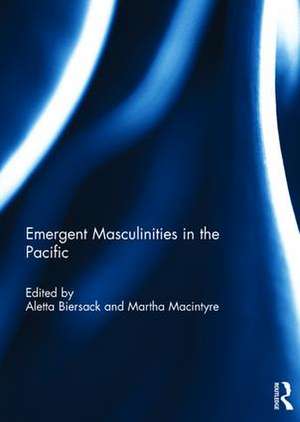Emergent Masculinities in the Pacific
Editat de Aletta Biersack, Martha Macintyreen Limba Engleză Hardback – 19 apr 2017
| Toate formatele și edițiile | Preț | Express |
|---|---|---|
| Paperback (1) | 296.75 lei 6-8 săpt. | |
| Taylor & Francis – 19 dec 2018 | 296.75 lei 6-8 săpt. | |
| Hardback (1) | 757.84 lei 6-8 săpt. | |
| Taylor & Francis – 19 apr 2017 | 757.84 lei 6-8 săpt. |
Preț: 757.84 lei
Preț vechi: 1027.88 lei
-26% Nou
Puncte Express: 1137
Preț estimativ în valută:
145.12€ • 156.97$ • 120.92£
145.12€ • 156.97$ • 120.92£
Carte tipărită la comandă
Livrare economică 11-25 decembrie
Preluare comenzi: 021 569.72.76
Specificații
ISBN-13: 9780415786942
ISBN-10: 0415786940
Pagini: 178
Dimensiuni: 174 x 246 mm
Greutate: 0.5 kg
Ediția:1
Editura: Taylor & Francis
Colecția Routledge
Locul publicării:Oxford, United Kingdom
ISBN-10: 0415786940
Pagini: 178
Dimensiuni: 174 x 246 mm
Greutate: 0.5 kg
Ediția:1
Editura: Taylor & Francis
Colecția Routledge
Locul publicării:Oxford, United Kingdom
Public țintă
Postgraduate and UndergraduateCuprins
Introduction: Emergent Masculinities in the Pacific 1. Bati as Bodily Labour: Rethinking Masculinity and Violence in Fiji 2. Once were Warriors, now are Rugby Players? Control and Agency in the Historical Trajectory of the Māori Formulations of Masculinity in Rugby 3. Inequality and Changing Masculinities Among the Gende in Papua New Guinea: The ‘Good’, the ‘Bad’ and the ‘Very Bad’ 4. Changing Generational Values and New Masculinities Amongst Smallholder Export Cash Crop Producers in Papua New Guinea 5. Being ‘Like a Woman’: Fa’afāfine and Samoan Masculinity 6. Men of War, Men of Peace: Changing Masculinities in Vanuatu 7. I Could Be the Last Man: Changing Masculinities in Enga Society 8. Masculine Sexuality, Violence and Sexual Exploitation in Micronesia
Notă biografică
Aletta Biersack is Professor Emerita, Department of Anthropology, University of Oregon, USA. Her principal research continues to be among the Ipili speakers of the Papua New Guinea highlands. She has edited and co-edited several collections: Clio in Oceania (1991); Papuan Borderlands: Huli, Duna, and Ipili Perspectives on the Papua New Guinea Highlands (1995); Ecologies for Tomorrow: Reading Rappaport Today (1999); with J. Greenberg, Reimagining Political Ecology (2006); and with M. Jolly and M. Macintyre, Gender Violence and Human Rights: Seeking Justice in Fiji, Papua New Guinea and Vanuatu (2016). Her current research interests include the dynamics of gold mining, gender transformations, witchcraft, and Christianities among Ipili speakers.
Martha Macintyre is an honorary Principal Research Fellow at the University of Melbourne, Australia and Adjunct Professor at the Centre for Social Responsibility in Mining at the University of Queensland, Australia. She has undertaken research in Papua New Guinea, and is the co-editor, with M. Jolly, of Family and Gender in the Pacific (1989); with M. Patterson, of Managing Modernity in the Western Pacific (2011); with A. Biersack and M. Jolly, of Gender Violence and Human Rights: Seeking Justice in Fiji, Papua New Guinea and Vanuatu (2016); and with C. Spark, of Transformations of Gender in Melanesia (2017).
Martha Macintyre is an honorary Principal Research Fellow at the University of Melbourne, Australia and Adjunct Professor at the Centre for Social Responsibility in Mining at the University of Queensland, Australia. She has undertaken research in Papua New Guinea, and is the co-editor, with M. Jolly, of Family and Gender in the Pacific (1989); with M. Patterson, of Managing Modernity in the Western Pacific (2011); with A. Biersack and M. Jolly, of Gender Violence and Human Rights: Seeking Justice in Fiji, Papua New Guinea and Vanuatu (2016); and with C. Spark, of Transformations of Gender in Melanesia (2017).
Descriere
Drawing on fieldwork and historical and ethno-historical research, ten authors offer eight in-depth case studies of the emergence of masculinities throughout the Pacific Islands. Read in conjunction, they pose questions about the role of colonialism and globalisation in shaping contemporary masculinities and of the degree of continuity between precolonial and postcolonial masculinities, establishing an agenda for future research in the decades to come. This book was originally published as a special issue of The Asia Pacific Journal of Anthropology.
